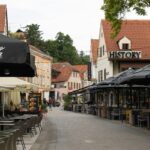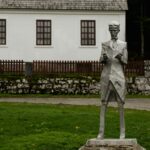ZAGREB, May 25, 2019 – More than 10,000 fans of former Yugoslav president Josip Broz Tito arrived in his birthplace of Kumrovec on Saturday to mark the Day of Youth and Joy, his official birthday, wearing Titovka caps, scarves, uniforms and T-shirts with his image, although this year there were far fewer flags with insignia of the former federation.
Although Josip Broz Tito Alliance president Jovan Vejnović said several buses were stopped at the Slovenian-Croatian border because some of those going to Kumrovec carried those insignia, the president of the SABA antifascist alliance, Franjo Habulin, said he had no information about the confiscation of flags or other items.
Vejnović said this year there were far more police monitoring the gathering than in recent years, and that “for the first time in 15, 16 years of this gathering,” they called the participants to order.
Vejnović said he would like the message sent out from Kumrovec to be that people of good will gathered there for the Day of Youth and Joy celebration.
He said those who gathered there were concerned about developments on the territory of the former Yugoslavia and the creation of national tensions instead of a space for communication, agreement and cooperation.
Municipal head Robert Šplajt said the gathering in Kumrovec was something positive and that the town had the chance to revive its 1980s heyday.
Habulin said the gathering was focused on those with youthful and creative energy whom this country needed, adding that “it’s necessary to create long term and stable economic conditions, a fiscal policy, a monetary-credit policy, to subordinate everything to the opening of new plants and to job creation so children will have somewhere to work.”
Deputy county head Jasna Petek said the message from the gathering should be that Croatia was created on anti-fascism, as stated in the constitution, adding that Tito, by putting the Partisan movement on the side of anti-fascism in 1941, had built its foundations “into all the achievements we have today.”
Former Croatian president Stjepan Mesić said he expected to see today “many flags under which the biggest victories in the history of our people were won, under which people were killed but also triumphed.”
He said history could not be revised. “We have met here first and foremost because of the man who organised the National Liberation Struggle (NOB) and brought Yugoslavia and all its republics and provinces to the victors’ table.”
He added that there would have been no present-day Croatia without the NOB. “We welcomed victory at the victors’ table and revisionists should understand that,” he said, adding that Yugoslavia had been an authoritarian but not a totalitarian state.
Hundreds of people from the former Yugoslavia gathered at the House of Flowers, Tito’s resting place in Belgrade, to honour him on May 25, his official birthday, bringing wreaths, flowers, and flags and insignia of the former Yugoslavia and the former League of Communists of Yugoslavia.
Despite controversies and disputes between historians and those who lived in Tito’s time over his role in the post-WWII executions of members of the defeated armies and political opponents, modern history ranks him among the most prominent leaders and statesmen of his era.
Thousands of people from the former Yugoslavia visit the House of Flowers every year on May 4, his death anniversary, and on May 25, a public holiday in the former federation.
Tito is linked to the communist and Partisan movements and the antifascist struggle which, in WWII, was crucial for the establishment of the Yugoslav federation, and to the creation of the Non-Aligned Movement.
More than 200 heads of state or government and senior delegations from 127 countries attended his funeral in Belgrade on 8 May 1980. Since then, more than 17 million people have visited the House of Flowers. Annually, the most numerous are tourists from Western Europe and the US, and increasingly from China, Japan and South Korea.
More news about Tito can be found in the Politics section.








